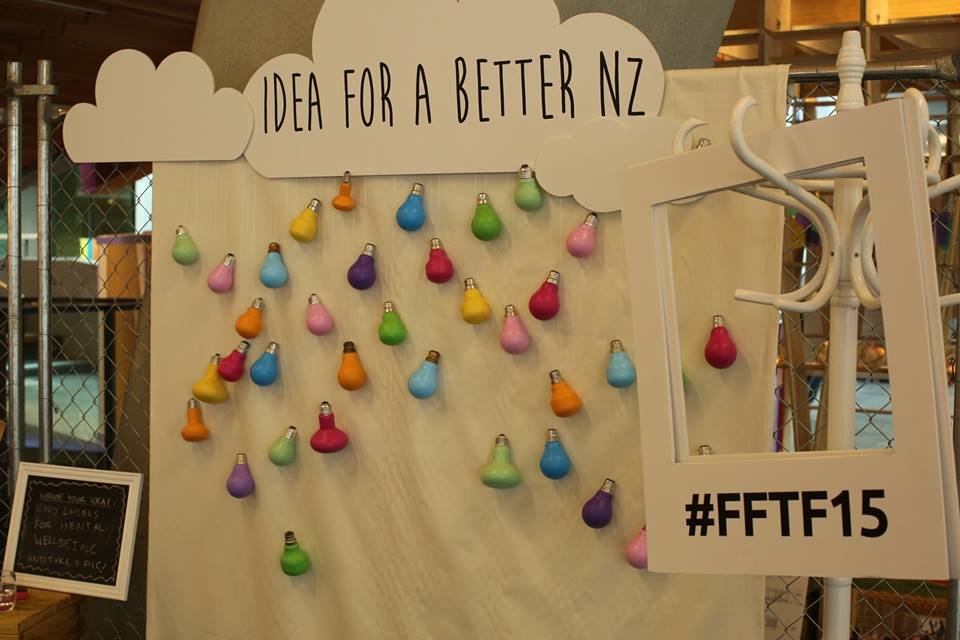
Which conference features bean bags, balloon raves and early morning yoga all in the name of empowering young innovators to change the world?
Festival for the Future was launched in 2010 by Inspiring Stories founder Guy Ryan (now the 2015 Young New Zealander of the Year) to bring young entrepreneurs, innovators and idealists together over one weekend to explore the big issues of our time and (hopefully) contribute to making the world a better place.
This year more than 500 people congregated at AUT University in Auckland for workshops, music and to listen to speakers who included New Zealand gay youth advocate Tabby Besley, winner of the 2015 Queen’s Young Leader Award; climate change activist Paul Young from Generation Zero; 2FACE Drama’s Charlizza Harris; 15-year-old disabled author Muskan Devta and Ryan himself.
Topics included sustainability, climate change, gender equality, youth unemployment and disability rights.
{% gallery ‘festival’ %}
Digital media aficionada Ellen Falconer headed along to the Festival for the Future and picked up five keys lessons for young social entrepreneurs.
Lead with the why
New Zealand – and the world – needs “a generation of rebels with a cause”, according to 25-year-old Holly Ransom, the youngest ever president of Rotary (an organisation renowned for its stale, pale, maleness). Ransom’s mantra is “lead with the why. Bring in the how and the what afterwards.”
Knowing why you are working on a project will help to clarify your goals and keep your motivation grounded, she says.
Another social entrepreneur, Richard Bartlett of Loomio, which created an online tool for collaborative decision making, called it “navigating with purpose”. If you’re not sure yet what your purpose is, start discussing your idea with others, he says. The key points will make themselves clear as you realise which are the ones that are repeated the most often.
Prioritise the vibe
Another nugget of wisdom from the Loomio team, was around how to encourage empathy and understanding in teams. Check-in with your team at the beginning of a meeting by asking questions like ‘How can we bring our feelings into the room?’ Bartlett said.
He believes communication is more effective when we know how our teammates are feeling and regular “check-ins” had also helped him to better understand and articulate his own feelings, and not just in the workplace.
Vulnerability also came up a few times over the Festival for the Future weekend. At workshops we often had to work together in groups, and sharing a moment of vulnerability early on helped to establish a bond of trust between former strangers and improved outcomes.
Personal storytelling is a powerful tool
In his workshop, illustrator Toby Morris explored the history of how art has been used for political impact, and got participants to create their own six-panel comic or poster. He emphasised that incorporating a personal element in art helps people to connect with it better.
In Morris’ work, this is shown in his hand-drawn lettering. This idea was also highlighted in a seminar on 21st century leadership, where we had to pitch an idea to a panel and convince them to make a change based on our argument (my group was assigned “What is one thing that everyone can do to stop climate change?”).
The judges agreed that the pitches with a personal story appealed to their emotions were the ones more likely to sway them.
Be guided by real people and real needs
Australian-born Holly Ransom was one of the best speakers of the weekend. She shared a story of an international aid group that had built a $25,000 well for a remote community. The locals didn’t use the well because it was on top of an ancient burial ground and they believed that if they drank from it bad spirits would enter them.
When working with a community, make sure you are learning as much from them as they are from you. Get to know their culture, traditions and social structure before white-knighting it on in there.
Failure is a part of success
Ben Dowdle spoke about how when we’re at forums such as Festival for the Future, we don’t hear about the failures of the people standing on stage, we only see their successful end result. His company Unmask Palm Oil campaigns for mandatory labeling of products that use palm oil.
Dowdle says when he first started he’d often send 40 emails in a weekend and not get a single reply. Don’t give up.
As AUT programme equity director Agnes Naera said, one of the most common reasons why university students fail is because they are paralysed by the fear of failure. Let’s acknowledge that failure is also a part of success and not be afraid to show our vulnerability.
 Ellen Falconer is content editor at Eventfinda, and contributes to The Wireless. She attended Festival for the Future to push herself out of her comfort zone and to be inspired by some intimidatingly successful young people.
Ellen Falconer is content editor at Eventfinda, and contributes to The Wireless. She attended Festival for the Future to push herself out of her comfort zone and to be inspired by some intimidatingly successful young people.




